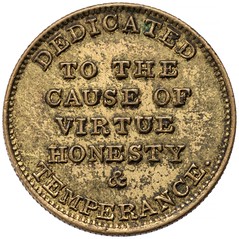
PREV ARTICLE
NEXT ARTICLE
FULL ISSUE
PREV FULL ISSUE
H. B. WEST AND HIS TRAINED DOGSScott Miller shared his article from the American Numismatic Society's Pocket Change blog, which covers H. B. West and his Trained Dogs. -Garrett I recently came across a listing for a small, 28 mm brass medal I had seen many times but never really thought about. On one side is a depiction of a man in a carriage drawn by two dogs, identified as H. B. West's famous trained dogs, Tray and Troy. The other side bears a view of New York's Crystal Palace and the date 1853. Charles Ira Bushnell listed this piece in his groundbreaking 1858 book An Arrangement of Tradesmen's Cards, Political Tokens, also, Elections Medals, Medalets, &c. Current in the United States of America in the Last Sixty Years. Bushnell placed it as number 83, under New York Tradesmen's Tokens. At least four other medals exist with the H. B. West obverse, though these appear to be mules, struck in very limited numbers for collectors, and have no real relation to West. To date, there has been virtually no reliable information published about Mr. West, or his famous trained dogs. There have been a few suggestions that his act might have appeared at the Crystal Palace as part of the Exhibition of the Industry of All Nations, even though it was not known as a venue for popular entertainment. In March 1918, H. G. Bennett of Louisville, Kentucky wrote a letter to the editor of The Numismatist asking for information about the H. B. West token. The inquiry specifically asked if the dogs were exhibited at the Crystal Palace or of the building was simply used on the token, and if it was actually issued in 1853. It seems that Mr. Bennett never received a reply. The American Numismatic Society has four examples of this medal in its collection, one of which was donated by an early member, William Leggett Bramhall, in 1859 (Fig. 1). Apart from the depiction of the Crystal Palace, there is no real reason to associate this medal with New York City. A look at the New York City Directory for 1853 reveals four people who might fit the bill for H. West, but none have an occupation that would suggest a match to the person on the medal. There is, however, at least one contemporary reference to West and his act. A notice in the Washington [D. C.] Sentinel of November 16, 1853, under the column "Local and Personal" was a single paragraph describing how "A Deformed Man, occupying a small carriage, drawn by two black dogs, is exciting not a little attention from the passers-by on the public thoroughfares, and drives a pretty brisk trade, when he is not driving his dogs, by the sale of medals of two kinds, the metal resembling gold." The article continues to describe one of these medals as the Crystal Palace piece. The other is a 21 mm temperance medal bearing an eagle on one side with the motto Honesty is the Best Policy, and a reverse "Dedicated to the cause of virtue, honesty, and temperance" (Fig. 2). West also sold a miniature book on the history of the Mexican Mustang Liniment, priced at 12 ½ cents. Cure-alls, often referred to as snake oil medicines, were common products a hundred and fifty years ago. As with others of its type, Mexican Mustang Liniment purported to be a wonder drug capable of curing a wide range of ailments in man and beast. Sounding a bit like the Beverly Hillbillies' Granny Clampett's rheumatiz medicine, it could cure people of sore throat, rheumatism, fresh cuts or wounds, and burns, to name just a few, and could also be applied to horses for a similar range of ailments. It was also the subject of a number of advertising banknotes from "The Mustang Bank," noting that that it could be exchanged for one bottle of Mexican Mustang Liniment "at any store in the civilized world" (Fig. 3). Not unduly modest, the note also advised that the product was "secured by a pledge of public confidence in every city, village town parish & hamlet throughout America, Europe and the Islands of the Ocean." The image of a dog-drawn cart may seem odd to us today, but was not all that unusual in the mid-nineteenth century, though probably not common in an urban environment (Fig. 4). As for the dogs, Tray is possibly named after the dog of the popular Stephen Foster song, Old Dog Tray. Troy, alas, might not have such an illustrious namesake. Just as we know nothing about Mr. West's deformity, we have no idea if the celebrated dogs did anything more than pull the carriage. Still, it makes a great piece of advertising, and a rare glimpse into a forgotten aspect of life in the days prior to the Civil War.
To read the complete article, see:
Wayne Homren, Editor The Numismatic Bibliomania Society is a non-profit organization promoting numismatic literature. See our web site at coinbooks.org. To submit items for publication in The E-Sylum, write to the Editor at this address: whomren@gmail.com To subscribe go to: https://my.binhost.com/lists/listinfo/esylum All Rights Reserved. NBS Home Page Contact the NBS webmaster 
|






